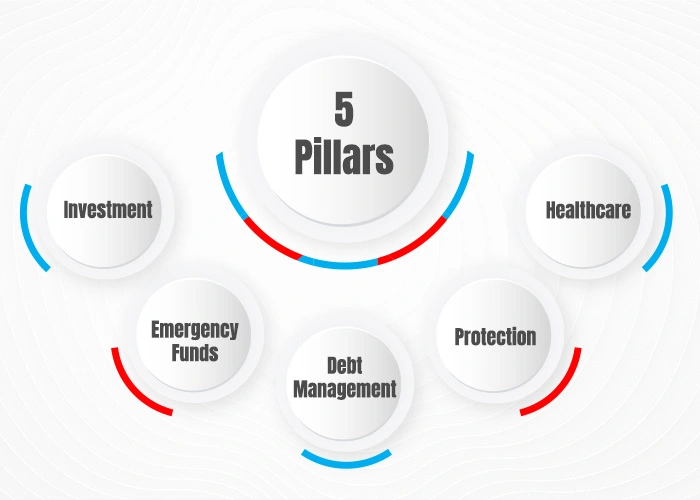
- Finance
- June 21, 2024
Building Your Financial Foundation: A Guide to Smart Money Habits
“Never spend your money before you have it.” – Thomas Jefferson
Excessive spending and a lack of saving habits are among the primary concerns of today’s generation. According to the report, millennials don’t believe in cost-cutting but rather have adopted a lifestyle of luxury. 75% of Gen Z spend freely on luxury items. This suggests that they are willing to splurge on high-end products. And it seems that the importance of saving money for the future is not a trend anymore. However, if you are struggling to manage your money, this blog is for you. Today, we will share some tips on how to save money, create a budget, and assist you with the crucial financial planning process that everyone requires. But before we get to that, let’s first familiarize you with the concept of a financial foundation.
What is Financial Foundation?
A foundation is the first building block of any structure, and it should be as sturdy as possible. Just like that, we have a financial foundation, which is the core of the life we plan to live. It includes the choices, habits, and practices that reflect your financial life. To have a strong base, you need to have the right building blocks, such as personal money management, controlling spending habits, and budgeting.
People often struggle to meet their financial and personal needs because they lack the necessary foundation. According to a survey by S&P, more than 75% of Indian adults do not adequately understand basic financial concepts, indicating a significant lack of financial foundation in the country. This explains the importance of financial education, which is required to help people reach their monetary goals.
An unfavourable financial condition often lets someone spend beyond their ability to afford basic needs, even if they earn a good income. Living in constant debt also damages their psychological well-being and causes chronic stress. This issue also impacts other individuals at different stages of their lives.
Let’s Discuss its Components
Fact: 5 pillars of a strong financial foundation are investment, emergency funds, debt management, protection, and healthcare.
These 5 interconnected pillars balance out your personal cash flow management. You can address each of these categories to secure a stable future.

Investment
Set aside a portion of your income for investment purposes. This will not reduce your money; it will increase it exponentially.
Emergency Funds
Keeping aside some money for emergency hours will relieve you of the stress you might have to face in the future.
Debt Management
Falling into a debt trap is a terrifying situation that requires immediate attention. Avoid forgetting about it or delaying it at all costs.
Protection
This pillar involves safeguarding your assets and income against potential risks. This can include life insurance, disability insurance, health insurance, and other forms of insurance coverage.
Healthcare
Any day, a health issue can knock on your door. Paying lengthy bills can be a daunting task. Plan for future expenses and go for health insurance, which can save you from this.
10 ways: Let’s Save Some Money
In 2020–21, people saved 11.5% of the gross domestic product (GDP), but in 2022–23, this rate dropped to 5.1%. This decline in household savings highlights the challenges people face in securing their finances. But don’t worry, as we will provide you with 10 easy ways to save your money and make your life a little stress-free.

-
Set Specific Savings Goals
Clearly define what you’re saving for and how much you need. For example, aim to save Rs. 30,000 for an emergency fund within two years. Attach a timeline and a target amount to make your goal tangible. Visualize what achieving this goal means to you as motivation.
-
Create a Budget
List all your income sources and fixed or variable expenses. Categorize expenses as needs or wants. Identify areas to cut back on, like dining out or cancelling unused subscriptions. There would be no harm if you did not eat your favourite dessert once a week or had all the streaming platforms available out there. Allocate funds towards savings based on your goals. Review and adjust your budget regularly as circumstances change.
-
Automate Your Savings
Set up automatic transfers from your checking account to a dedicated savings account. Decide on an amount that’s challenging yet achievable, like Rs. 500 per pay check. Automating ensures you save consistently without manually transferring funds, reducing the temptation to spend that money.
-
Pay Yourself First
Before spending on non-essentials, transfer a predetermined portion of your income to savings. Treat this like paying a bill to yourself. For example, commit to saving 10% of each pay check. This prioritizes savings over discretionary spending, helping you reach your goals faster.
-
Reduce Discretionary Spending
Analyse your spending habits and identify areas for trimming non-essential expenses. Cook at home instead of ordering food, cancel unused subscriptions, and avoid impulsive purchases. Replace costly habits with free or low-cost alternatives, redirecting those funds towards your savings goals.
-
Implement the 24-Hour Rule
Whenever tempted to make a non-essential purchase, wait 24 hours before committing. This cooling-off period helps distinguish between true needs and momentary wants. Often, the urge to buy subsides, saving you money and preventing Buyer’s remorse.
-
Take Advantage of Windfalls
If you receive a tax refund, bonus, inheritance, or other lump sum, resist the urge to splurge. Instead, allocate a significant portion (e.g., 50%) or the entire amount towards your savings goals, providing an instant boost to your progress.
-
Explore High-Interest Savings Accounts
Research and open a high-yield savings account that offers competitive interest rates. While rates may fluctuate, your savings can grow faster through compound interest over time. Compare options and fees from different banks and credit unions.
-
Cut Recurring Costs
Evaluate your recurring monthly expenses, such as cable, internet, gym memberships, and streaming services. Cancel or downgrade services you don’t use frequently or could live without. Redirect those savings towards your goals, potentially freeing up hundreds of rupees annually.
-
Increase Income Streams
Explore opportunities to earn extra income through side hustles, freelancing, or taking on additional work. Dedicate a predetermined percentage of this supplemental income directly to your savings goals, accelerating your progress without compromising your regular budget.
If you diligently follow these 10 ways, you can save a significant amount of money, thereby eliminating the need to wait for a long-awaited trip. Or if you encounter an emergency, you won’t need to search for any additional funds. This personal finance education will help you cope with difficult money matters.
Quick Tips
- Create a list of your triggers.
- Put off making a purchase.
- Keep a budget in place and monitor it closely.
- Search for healthy alternatives.
Book Recommendations
Try to read these books for better money management.
- The Total Money Makeover
- Suddenly Frugal: How to Live Happier and Healthier for Less
- The No-Spend Challenge Guide: How to Stop Spending Money Impulsively, Pay Off Debt Fast, and Make Your Finances Fit Your Dreams
- The Financial Diet: A Total Beginner’s Guide to Getting Good with Money
Happy Saving
All in all, we can conclude that saving 1 today can lead to earning 100 in the future. The financial strategies mentioned in the blog will help you start saving effectively and as early as possible. At times, it might seem difficult because everyone wants to have that burger they saw coming back home or the bag hanging in the shop. But that’s what saving with the mind means. It’s akin to enjoying both the cake and the icing. This is the benefit of smart savings. With this, you are never at a loss.
Be the first to review “Message Financial Board Game Cancel Reply
RELATED POSTS

- Finance
- September 30, 2024

- Finance
- September 26, 2024

- Finance
- September 23, 2024












you have a great blog here! would you like to make some invite posts on my blog?